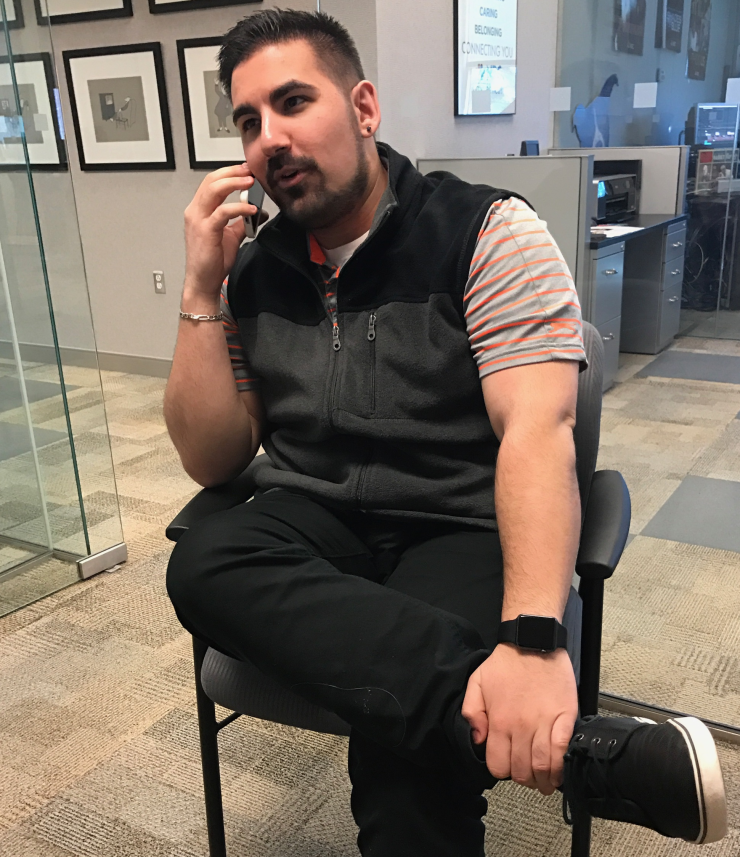Unlike most of his college friends, Cody Ripa was 21 and maxing out Roth IRA contributions. He learned about saving for retirement by scrolling through Reddit threads and reading dozens of books.
Now 26 and working as a promotions producer in Cheshire, Connecticut with a Roth IRA and a 401(k), Ripa is the engaged young investor that wealth management firms hope to capture with low-cost digital advice solutions.
But Ripa has neither a financial adviser nor a robo advice account. Like many of his peers, short-term financial concerns get in the way of committing to additional retirement planning.
"For a young person to invest $5,500 dollars [with a wealth manager], that's a lot of money," Ripa says. "You have to think, 'I'm not going to touch this money,' and that can be difficult. It's one of the most challenging things ever."
Anticipating that millennials will one day inherit baby boomers' wealth, firms have turned to technology as one strategy to capture young clients.
But a discussion with several young investors reveals many are limiting their engagement to micro savings platforms and apps. Trust and commitment issues stand in the way of deeper, more complex advisory relationships.

Young clients say they are wary of Wall Street, recalling the financial crisis. They also shy away from locking into an agreement or using what they see as expensive services.
These 20-somethings are just beginning their saving and investing journey and there's no time like the present to get them on the right track.
According to a 2016 Wells Fargo survey, 41% of millennials aren't saving for retirement. Another study by Corporate Insight found that 42% of millennials have less than $50,000 in their employer-sponsored plans.
The millennials interviewed by Financial Planning can be best described as taking a "sampling" approach toward investing: seeking information with no strings attached, in piecemeal and focused on short-term needs or a goal rather than an entire plan toward a retirement date.
Those that speak to advisers are referrals from family members. But still, the preference is to manage as much as they can on their own, and to invest conservatively.

"I think we're a generation of problem solvers," says Clay McInnes, a 30-year-old business owner and angel investor in Montgomery, Alabama. "We're not going to be happy with turning over our money and letting people manage it for us."
ATTITUDE CHANGE
In addition to wanting more independence, millennial investors are also not buying into traditional visions of what retirement should be.
"I find retirement funny," says Lauren Besthoff, a 20-year-old college student at the University of Hartford. "I have two grandparents still working and they're in their 80's. I don't think there should be an exact retirement age."
Besthoff has a savings account, and nothing else ― not even student loans. Studying to be a teacher, she plans on paying for her graduate degree by herself. "Saving up money for the future, car, house, kids, that's more like 10 years in the future," she adds.
According to Merrill Edge, nearly 83% of millennials plan to work through retirement.
"They are struggling with savings," says Silviya Simeonova, a senior analyst at Corporate Insight. "Millennials are worried about paying off school debt and meeting short-term or long-term goals."

Lauren Drew, who works in government relations for a non-profit in Silver Spring, Maryland, is 30 and describes her student loan debt as "overwhelming."
"You're sticking your finger in the dike," Drew says. "You're doing what you're supposed to do and trying but this huge amount of debt on your back — you only have so many fingers. Your loans are due every month whether you're saving or not."
McInnes, who earns six-figures and has two Roth IRAs, a money market account and an investment account with Wells Fargo, did not have student loans but his wife did.
Even though his family has an adviser that he trusts, McInnes has a savings account Acorns, a savings app that rounds up credit card purchases and deposits the change into the account. He also has a Robinhood trading account, which offers free stock trading.
Entrepreneurship, not by retirement investing alone, is how the next generation will build their wealth, he says. "I have some money in the stock market, but I think I can do better solving problems on my own starting a business than sitting with an adviser."
Millennials have also exhibited strong conservative tendencies in their approach to investing.
"I like the idea of making a little more money and once I become financially savvy enough, maybe I can manage it on my own. But I definitely don't feel comfortable at the moment doing that," says Yaina Montgomery.
Montgomery is a 25-year-old stay-at-home, soon-to-be mother in Gailesburg, Illinois. She and her husband have a savings account and a Roth IRA. Additionally, her husband's job with a railway company provides them an HSA account, a pension and an additional retirement plan.
But the young couple has no intention of seeking out a financial adviser or wealth management firm. "The only thing that we really trust is the retirement account and right now we have some student debt to pay off," Montgomery says.
Plus, she adds: "If I don't have access to it, it's not mine."
'SEEING A DESIRE'
Millennials are the most "educated generation ever," according to Nicole Sherrod, managing director of trading for TD Ameritrade, who acknowledges too "there's a certain distrust of Wall Street that's evident."
Younger investors are "allergic" to standard investing avenues because of Wall Street's history over the last decade, says Lex Sokolin, the global director of fintech strategy at Autonomous Research.
"If all you learned about the financial services industry is scandals and collapses that will go against you trusting [big] brands" Sokolin says.
That's not to say that younger investors are rejecting investing outright.
"We are seeing a desire," says David Poole, the managing director of Bank of America's Merrill Edge. "What we are seeing is (millennials) want validation and guidance. When you look at millennials, our data shows us 70% have a hands-on approach, compared to boomers."
"I have some money in the stock market, but I think I can do better solving problems on my own starting a business than sitting with an adviser," says Clay McInnes, a 30-year-old business owner.
Low-cost, simple PFM app providers say they are better suited than even robo advisers to pull in this demographic, as they offer instant manageability and allow for the smallest amounts to start an account, making it an easier proposition for the wary young investor.
"We need it to make investing relatable and address the issue of financial literacy in this country," says Brandon Krieg, CEO and co-founder of Stash, a micro savings app. "That's why we dropped our minimum to $5 so anyone can invest and they can learn as they go."
Acorns also offers accounts for $1 monthly fees or 0.275% fee on accounts more than $5,000. (Stash's monthly fee for accounts over $5,000 is 0.25%).
"We didn't want to make it a trade-off, [that] to start investing, you have to stop other things to start investing," says Manning Field, Acorns' chief commercial officer. "We found by automating as much as this as possible and using existing behavior to start building [wealth] is the best way to do that."
Sokolin says apps like Stash and Acorns are part of the "fourth wave of robo advice" and have gained traction by focusing much more on savings.
This approach works best for Chris Breen, a 28-year-old business development executive in Queens, New York.
"Since I was 20, I would take my change and save it," Breen says. "Now I could do that with the app. And I get to still say that I'm investing."
Breen, who wants to buy a house in the next two years, said he looks at these accounts as "small victories," whether it's just for extra cash to go on vacation or saving up more to invest in more aggressive portfolios.
"Big banks wouldn't need my investments," Breen says.






